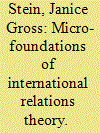| Srl | Item |
| 1 |
ID:
153563


|
|
|
|
|
| Summary/Abstract |
Almost forty years ago, a small group of scholars drew on cognitive psychology to explain anomalous patterns of behavior by leaders on issues of international security. Although it made significant contributions to theory and research, that scholarship did not diffuse broadly into the field. Drawing on concepts in psychology and behavioral economics, research that uses new methods is now producing a wave of scholarship in international relations exemplified by the work in this special issue. Analysis of the use of prospect theory over the last three decades identifies the scope conditions that enable the predictions of rational choice and psychological theories. These scope conditions motivate the focus on the heterogeneity of decision makers that is at the core of current contributions. Future research will move beyond the now-sterile debate between rational choice and psychology.
|
|
|
|
|
|
|
|
|
|
|
|
|
|
|
|
| 2 |
ID:
179145


|
|
|
|
|
| Summary/Abstract |
The British Foreign Office Information Research Department (IRD) was established in 1948 to counter Cold War-era disinformation promulgated by the Soviet Union.1 The Future Foreign Publicity Policy cabinet memorandum, which established the IRD, stated that the department would be a “small Section in the Foreign Office to collect information concerning Communist policy, tactics and propaganda and to provide material for our anti-Communist publicity….”2 However, the memorandum’s authors failed to anticipate the scale of specialized resources that would be needed to adequately fight communist disinformation worldwide. Not only would Sir Ralph Murray, first head of the IRD, need substantially more than a small staff; he would also require specialized skill sets that were not well represented in the diplomatic services and were difficult to recruit. Primarily, they recruited “authors and publishing houses to serve as conduits for non-attributable IRD ventures, and some of the most respected names amongst the British democratic left ended up authoring works quietly organized and funded by the IRD.”3 This was especially noteworthy in 1949, when the IRD attempted to dramatically scale up its operations by influencing British commercial publishing.
|
|
|
|
|
|
|
|
|
|
|
|
|
|
|
|